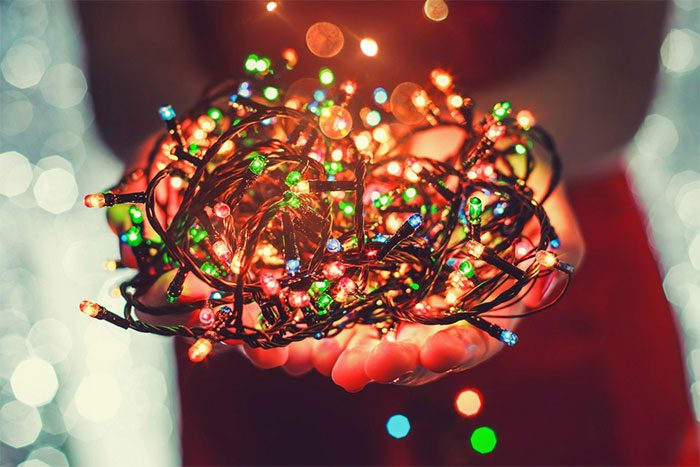Some holiday decorative lights contain lead, posing cancer risks and reproductive harm.
In preparation for the most wonderful time of the year, many families purchase colorful light strings to decorate Christmas trees, peach trees, apricot trees, and kumquat trees for the Lunar New Year.
However, upon opening the box of these decorative lights, a warning has caused concern among many: “Cancer and reproductive harm.”

Decorative lights should be hung out of children’s reach to ensure safety. (Photo: Cordis).
Consumers have accessed the link printed on the packaging and learned that holiday decorative lights may increase the risk of cancer and reproductive harm.
Some holiday lights purchased from local stores or warehouses are coated with hazardous chemicals such as lead.
If you closely examine the packaging of products like furniture, vases, and even certain types of food, you may notice a warning for Prop 65. Prop 65 was established before the internet, by the people of California, where there are laws that “require businesses to provide warnings to the public about exposure to chemicals that cause cancer, birth defects, or other reproductive harm.”
This is how you can ensure you are protected from health risks when shopping for holiday decorations this year.
3 Safe Decoration Tips for Holiday Lights
According to Dr. Fred Henretig, a toxicologist at the Children’s Hospital of Philadelphia, compared to other exposure risks during this time of year, holiday decorative lights are not a major concern.
However, if the exposure to hazardous chemicals from holiday lights worries you, the Prop 65 warning suggests:
- Wash your hands after installing or removing holiday lights, especially if you plan to prepare food or eat immediately afterward.
- Ensure that young children do not play with the lights or put them in their mouths.
- Look for and use decorative lights labeled “lead-free.”
Dr. Fred Henretig also advises: “I recommend wearing gloves when hanging holiday lights.”

After decorating with light strings, everyone should wash their hands thoroughly to remove any harmful substances. (Photo: Stratus HR).
Some decorative lights pose cancer and reproductive risks
Dr. Fred Henretig mentions that when handling certain types of holiday decorative lights, individuals may be exposed to chemicals such as lead and phthalates, which are common in many plastics.
“It seems to primarily reside in the wiring system,” he adds.
The cancer risk may be associated with phthalates, based on studies examining exposure to these chemicals and the development of certain cancers in children, although there isn’t much data on humans.
However, phthalates are linked to endocrine disruption and “may negatively impact cognitive development in young children,” Dr. Fred Henretig notes.
Regarding lead exposure, the biggest concern is for pregnant women and children under the age of 5. “I don’t think this is a serious issue that should prevent people from decorating with lights indoors. It’s important to hang lights out of children’s reach,” he points out.
According to the Prop 65 warning, it is fine to touch the lights. However, touching your mouth immediately afterward without washing your hands can transfer chemicals from the wiring system into your body.
For pregnant women, “these chemicals can transfer from mother to child,” the warning states.
Dr. Fred Henretig indicates that low-level lead exposure can adversely affect children’s cognitive abilities, including developmental delays.


















































